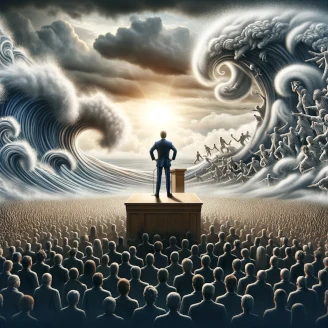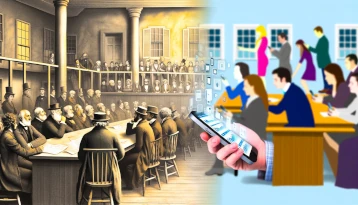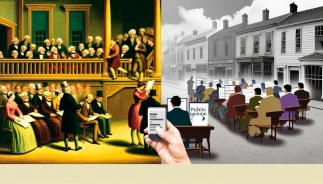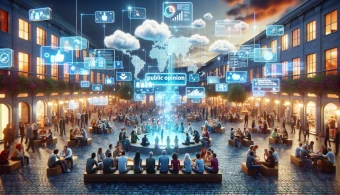What is Public Opinion?
Opinions are like A-holes everyone has one including me. Public opinion is a powerful force that shapes the political landscape in any democracy. It represents the collective beliefs, attitudes, and sentiments of the general public on various issues. In essence, it is the voice of the people, reflecting their preferences and values. Public opinion plays a critical role in influencing government policies, decisions, and actions.
Key Takeaways:
- Public opinion influences policymaking and governance in democracies, reflecting the will of the people.
- It ensures government accountability and representation, guiding leaders to act in the public’s interest.
- Public opinion shapes political debates and policy directions, highlighting its critical role in democratic processes.
Table of Contents
Public Opinion
In politics, public opinion holds significant sway over politicians and policymakers. Elected officials are keenly aware of the importance of aligning their actions with public sentiment to maintain popular support.
Understanding public opinion helps politicians gauge what matters most to voters and tailor their agendas accordingly. For example, if a public opinion poll reveals widespread concern about rising crime rates, politicians may prioritize implementing tougher crime prevention measures to address this issue.
The impact of public opinion on politics is not limited to elected officials alone; it also affects the broader political process. Political parties often conduct extensive research to gauge public sentiment on key issues through surveys, focus groups, and other methods.
This data informs their campaign strategies and policy platforms to resonate with voters. Ultimately, the ebb and flow of public opinion can determine election outcomes and shape the direction of governance in a democratic society.
Why is Public Opinion Important?

Public opinion plays a crucial role in the functioning of a democracy. It represents the collective voice and sentiment of the people, reflecting their beliefs, values, and preferences on various issues. In a democratic society, where power ultimately resides with the people, public opinion serves as a barometer for measuring the pulse of the nation.
It informs policymakers about the needs and desires of the populace, guiding them in making decisions that align with the will of the majority. Political leaders rely on public opinion to gauge public support for their policies and initiatives.
By understanding the prevailing sentiments among citizens, politicians can tailor their agendas to better resonate with voters, increasing their chances of electoral success. Moreover, public opinion research provides valuable insights into emerging trends and shifts in societal attitudes, helping policymakers anticipate and respond to changing dynamics in a timely manner.
Public opinion affects every aspect of the political process, from elections to policy formulation and implementation. Politicians who ignore or disregard public sentiment risk alienating voters and facing backlash at the ballot box.
Therefore, staying attuned to public opinion is not only essential for winning elections but also for governing effectively in a representative democracy.
A classic example of how public opinion influences politics is seen in grassroots movements that mobilize support around specific issues, compelling policymakers to address these concerns or risk losing credibility with voters.
When Should Political Leaders Not Follow Public Opinion?

There are certain situations where political leaders may find it necessary to deviate from public opinion to make decisions that align with the greater good of society. While public opinion is crucial in a democratic system, there are instances where following the will of the majority may not be in the best interest of the country as a whole.
One scenario where political leaders should consider going against public opinion is when the issue at hand requires expertise or specialized knowledge that the general population may not possess. In complex matters such as economic policies or national security decisions, experts and policymakers may need to rely on their professional judgment rather than bowing to popular sentiment.
This ensures that decisions are made based on facts and analysis rather than emotion or uninformed views. Additionally, there are times when public opinion may be swayed by misinformation or biased sources, leading to a distorted understanding of an issue.
In such cases, political leaders have a responsibility to educate the public and provide accurate information to counter false narratives. By taking a stand against misleading opinions and communicating transparently with citizens, leaders can help guide public opinion toward more informed and rational perspectives.
When Should Political Leaders Not Follow Public Opinion
National Security:
Leaders may have access to sensitive information that the public does not, necessitating actions that might be unpopular or not fully understood by the general populace. In such cases, prioritizing the safety and security of the nation might require decisions that deviate from public sentiment.
Long-term vs. Short-term Benefits:
Public opinion often leans towards short-term benefits or solutions, which may not always align with the long-term interests of a country. Leaders might prioritize long-term goals and sustainability over immediate satisfaction, which might temporarily conflict with public preferences.
Moral and Ethical Considerations:
There may be instances where the majority’s opinion conflicts with fundamental ethical or moral principles (e.g., issues of human rights or equality). Leaders might choose to uphold these principles, even if they are unpopular, to ensure the protection of minority rights or to adhere to international norms and laws.
Expert Advice and Evidence-Based Policy:
Leaders often consult experts in various fields whose insights might lead to decisions that are contrary to public opinion. This is especially relevant in complex areas such as climate change, healthcare, and economic policy, where expert knowledge is crucial for effective decision-making.
Preventing Populism and Agent Provocateur
Following public opinion blindly can lead to populism or alarmism where leaders exploit popular desires and prejudices rather than making informed, rational decisions. Responsible leaders may resist such pressures to prevent potential harm to democratic institutions and societal cohesion.
Protecting Minority Rights:
Democratic governance is not just about the majority’s will but also about protecting minority rights. Leaders may need to act against the majority’s opinion to prevent the tyranny of the majority, ensuring that all citizens’ rights are protected, regardless of their popularity.
Economic Stability:
Economic policy decisions are often complex and counterintuitive. Measures that are economically sound and necessary for stability, such as austerity measures during a fiscal crisis, may be extremely unpopular. Leaders might choose to implement them for the greater economic good, despite public resistance.
Informed Decision-Making:
The general public may not always have access to or interest in all the information necessary to make informed decisions on complex issues. Leaders, ideally, consider a broader range of factors and implications in their decision-making processes.
In these situations, leadership involves making difficult choices that might not always align with public opinion. However, leaders must communicate their decisions effectively, explaining the rationale behind their actions and how they serve the public interest in the long run. This transparency and dialogue can help bridge the gap between leadership decisions and public understanding or acceptance.
Public Opinion in Government

Public opinion plays a crucial role in government, shaping the decisions made by policymakers and politicians alike. In politics, public opinion refers to the views, attitudes, and beliefs of the general population on various issues. These opinions can greatly influence the political process, as elected officials often take into account the sentiments of their constituents when making decisions.
Public opinion in government is often measured through political opinion research, such as polls and surveys. These tools help policymakers gauge public sentiment on specific policies or issues.
For example, a recent public opinion poll showed that a majority of voters support increased funding for education. This information can inform lawmakers’ decisions on budget allocations and legislative priorities.
The impact of public opinion on politics cannot be understated. Elected officials are ultimately accountable to the people who voted them into office, so understanding and responding to public sentiment is crucial for maintaining their support.
Public opinion affects the political process by influencing which policies are prioritized, which candidates are elected, and even which laws are passed. By staying attuned to public opinion, politicians can better represent the interests of their constituents and make informed decisions that reflect the will of the people they serve.
How Does Public Opinion Influence Public Policy?
When it comes to public policy, public opinion plays a crucial role in shaping the decisions made by policymakers. Public opinion, which reflects the views, attitudes, and beliefs of the general population on various issues, holds significant sway over the direction that policies take. Politicians and government officials often pay close attention to public sentiment when formulating and implementing policies to ensure they align with the preferences of the people they serve.
Political opinion research serves as a valuable tool in gauging public opinion and understanding how it influences politics. Through surveys, polls, focus groups, and other research methods, policymakers can gain insights into what issues matter most to the public and how they feel about specific policy proposals.
By analyzing this data, decision-makers can tailor their policies to better reflect the desires of their constituents. A classic example of how public opinion affects the political process is seen in cases where elected officials are swayed by widespread public outcry or support for certain issues.
For instance, if a particular policy receives overwhelming support from the public, politicians may be more inclined to prioritize that issue and work toward implementing relevant legislation. Conversely, if there is strong opposition to a proposed policy change from the majority of voters, politicians may reconsider their stance or seek alternative solutions that are more in line with public preferences.
Public Opinion Research

Public opinion research plays a crucial role in understanding the perspectives and preferences of the general population. By conducting surveys, polls, and focus groups, researchers can gather valuable insights into what people think about various issues.
This data is essential for policymakers, political candidates, and organizations to make informed decisions that align with public sentiment. When it comes to political opinion research, the goal is to gauge public attitudes toward specific policies, candidates, or current events.
Pollsters use various methods to collect data, such as phone surveys, online questionnaires, and in-person interviews. By analyzing this information, political analysts can identify trends and patterns in public opinion that help shape campaign strategies and policy initiatives.
An example of how public opinion research influences politics is during election campaigns. Candidates rely on polling data to understand which issues resonate with voters and tailor their messaging accordingly.
By tracking changes in public opinion over time, politicians can adapt their platforms to appeal to a broader audience. Ultimately, political opinion research serves as a compass guiding decision-makers through the complex landscape of public sentiment.
Public Opinion Strategies
Public opinion strategies play a crucial role in shaping political campaigns and influencing policy decisions. These strategies involve various techniques and tactics used to gauge and manipulate public sentiment.
One common approach is conducting public opinion polls to measure the views of the electorate on specific issues or candidates. By analyzing these polls, political strategists can gain valuable insights into voter preferences and tailor their messaging accordingly.
Another important aspect of public opinion strategies is the use of media campaigns to sway public perception. Through targeted advertising, speeches, and social media outreach, political candidates can shape how they are perceived by the public.
Crafting a compelling narrative that resonates with voters is essential in winning their support and ultimately influencing election outcomes. Understanding the psychology of persuasion and employing effective communication techniques are key components of successful public opinion strategies.
Moreover, harnessing the power of grassroots movements and mobilizing supporters is a vital strategy for shaping public opinion. By organizing rallies, events, and community outreach initiatives, political campaigns can energize their base and rally support for their agenda.
Building a strong coalition of advocates who champion your cause can amplify your message and influence public opinion in your favor. Public opinion strategies that focus on grassroots engagement can create a groundswell of support that reverberates throughout the political landscape.
Court of Public Opinion
When it comes to the realm of public opinion, there is perhaps no more fickle and influential entity than the court of public opinion. This court, which operates outside the confines of a traditional legal system, holds immense power in shaping societal norms and values. In politics, the court of public opinion can make or break a politician’s career with a single scandal or misstep.
The court of public opinion is driven by emotion, and perception, and often relies on sensationalism rather than facts. In today’s hyperconnected world where news spreads like wildfire through social media channels, the court of public opinion can swiftly pass judgment on individuals or organizations before all the facts are even known.
A seemingly innocent comment taken out of context or an ill-timed photo can quickly escalate into a full-blown controversy that tarnishes reputations irreparably. Politicians are acutely aware of the power wielded by this court and often go to great lengths to shape their image and message in ways that will resonate positively with the public.
One only needs to look at recent examples in politics to see how deeply the court of public opinion can impact political outcomes. A politician who aligns themselves with a controversial issue may find themselves facing backlash from constituents who hold opposing views.
Similarly, a candidate embroiled in scandal may see their support dwindle as public opinion turns against them. Understanding and navigating the nuances of the court of public opinion is essential for any political figure seeking to maintain relevance and credibility in today’s fast-paced digital landscape.
Examples of Public Opinion
One striking example of public opinion affecting the political process is the civil rights movement in the United States. In the mid-20th century, a groundswell of public opinion shifted towards advocating for equality and an end to racial segregation. This shift in public sentiment put pressure on political leaders to address these issues and ultimately led to landmark legislation such as the Civil Rights Act of 1964 and the Voting Rights Act of 1965.
The power of public opinion, when mobilized effectively, can drive significant change in government policies and laws. Another powerful example of public opinion influencing politics is the environmental movement.
As awareness grew about the impact of human activities on the environment, public opinion shifted towards advocating for conservation, sustainable practices, and addressing climate change. This shift in public sentiment has led to increased government regulations on pollution, investments in renewable energy sources, and international agreements aimed at reducing carbon emissions.
The collective voice of concerned citizens has pushed environmental issues to the top of political agendas worldwide. In a more recent example, we can see how social media has amplified public opinion on various political matters.
Social Media Affect on Public Opinion
Platforms like Twitter and Facebook have provided a space for individuals to express their views on policies, politicians, and current events in real-time. Politicians now closely monitor these platforms to gauge public sentiment and adjust their strategies accordingly.
Social media has democratized political discourse by giving ordinary citizens a direct channel to influence debates, shape narratives, and hold leaders accountable. It’s clear that public opinion is no longer confined to traditional polling methods but extends into the digital realm with unprecedented reach and impact.
Political Opinions in the U.S.
Pew Research Center highlights several public opinions, including 74% of Americans viewing the war between Russia and Ukraine as important to U.S. national interests, with 43% describing it as very important.
Another aspect is the view on democracy and social media, with majorities in most countries surveyed, including the U.S., seeing social media as more of a good thing than bad for democracy. This reflects a nuanced perspective on technology’s role in societal discourse.
The political landscape is often a significant area of interest for public opinion polls. For instance, various surveys and analyses look into topics like electoral prospects, policy opinions, and the public’s stance on key issues such as health care, the economy, and foreign policy.
Although specific recent poll results were not detailed in the provided content from Politico, the site covers a wide range of topics relevant to public opinion in politics, suggesting a broad and dynamic range of opinions across the country
Public opinion on Donald Trump and Joe Biden, as they consider the 2024 presidential race, reveals a complex landscape shaped by various factors, including party loyalty, perceived effectiveness, and individual attributes.
Donald Trump:
His favorability among the American public has remained relatively stable over the past year, despite facing criminal indictments. Among Republicans and Republican-leaning independents, 66% have a very or mostly favorable opinion of him, although this represents a decline from the previous year.
Despite these challenges, Trump’s overall unfavorability rating among the general American public stands at 63%, with 35% viewing him favorably.
Joe Biden:
On the other hand, holds a slightly more favorable position compared to Trump, with 46% of Americans approving of his job performance.
Within the Democratic Party, there’s a growing sentiment that Biden represents their best chance of retaining the presidency in 2024, a notable shift from previous skepticism. Among Democrats and Democratic-leaning independents, 83% have a favorable view of Biden, underscoring his solid base of support within his party.
A Quinnipiac University poll:
Highlighted that nearly six in ten Americans viewed Trump’s 2024 run as unfavorable shortly after his announcement. This reflects a divided sentiment towards his candidacy. Interestingly, the same poll indicates that opinions on Biden are mixed, with his performance on issues such as age, mental & physical fitness, and ethics being compared with Trump’s, suggesting that public perception varies significantly on different aspects of their potential candidacies.
The Marist Poll provides further insights, indicating that half of Democrats and Democratic-leaning independents believe the party has a better chance of winning the White House in 2024 with Biden as its nominee. Conversely, a majority of Republicans and Republican-leaning independents think the GOP has a better chance of winning the Presidency with someone other than Trump as the party’s nominee, reflecting a desire within the GOP to potentially explore new leadership options for the next presidential election.
These findings illustrate the nuanced views of the American electorate towards both Donald Trump and Joe Biden as they consider their options for the 2024 presidential race. While both figures have their loyal supporters, there’s a clear indication of division and debate within their respective parties and among the general public about their suitability for the presidency moving forward.
Conclusion
In the grand scheme of politics, public opinion weaves together the threads of democracy. It serves as a guiding light for leaders, illuminating the path forward through the complex maze of governance. Public opinion in politics is akin to a compass, pointing towards collective desires and values.
It shapes policies, influences decisions, and holds leaders accountable for their actions. Consider the power of public opinion in shaping historical events.
From civil rights movements to environmental reforms, public sentiment has been instrumental in driving change on a monumental scale. Take, for instance, the Civil Rights Movement in the United States during the 1960s.
The strong public opinion in favor of equality and justice propelled activists to push for legislative changes that transformed society. Political opinion research plays a crucial role in understanding and interpreting public sentiment.
By delving into surveys, polls, and focus groups, researchers can unravel the complexities of public opinion and provide valuable insights to policymakers. This research helps bridge the gap between leaders and citizens, fostering a more responsive and inclusive political process.
As we navigate the intricate landscape of politics intertwined with public opinion, one thing remains clear – democracy thrives when voices are heard and respected. Public opinion affects not only the political process but also shapes our collective future.
By recognizing the power vested in each individual’s voice, we can cultivate a society where diverse opinions converge toward progress and unity. Let us embrace this journey with optimism and determination to build a better tomorrow together.
Frequently Asked Questions
Why is public opinion important in a democracy?
Public opinion reflects the collective beliefs and attitudes of citizens, guiding policymakers and ensuring that government actions align with the will of the people.
How does public opinion influence policy decisions?
Policymakers use public opinion data to gauge voter preferences and priorities, shaping policies to align with constituent desires and increase political support.
What tools are used to measure public opinion?
Surveys, polls, focus groups, and social media analysis are commonly used to gather data on public sentiment.
Can public opinion affect election outcomes?
Yes, public opinion can determine which candidates are elected and influence the success of policy initiatives.
Why should political leaders pay attention to public opinion?
Understanding public opinion helps leaders maintain support, make informed decisions, and ensure their policies reflect the electorate’s values.

Super-Duper site! I am loving it!! Will come back again. I am bookmarking your feeds also